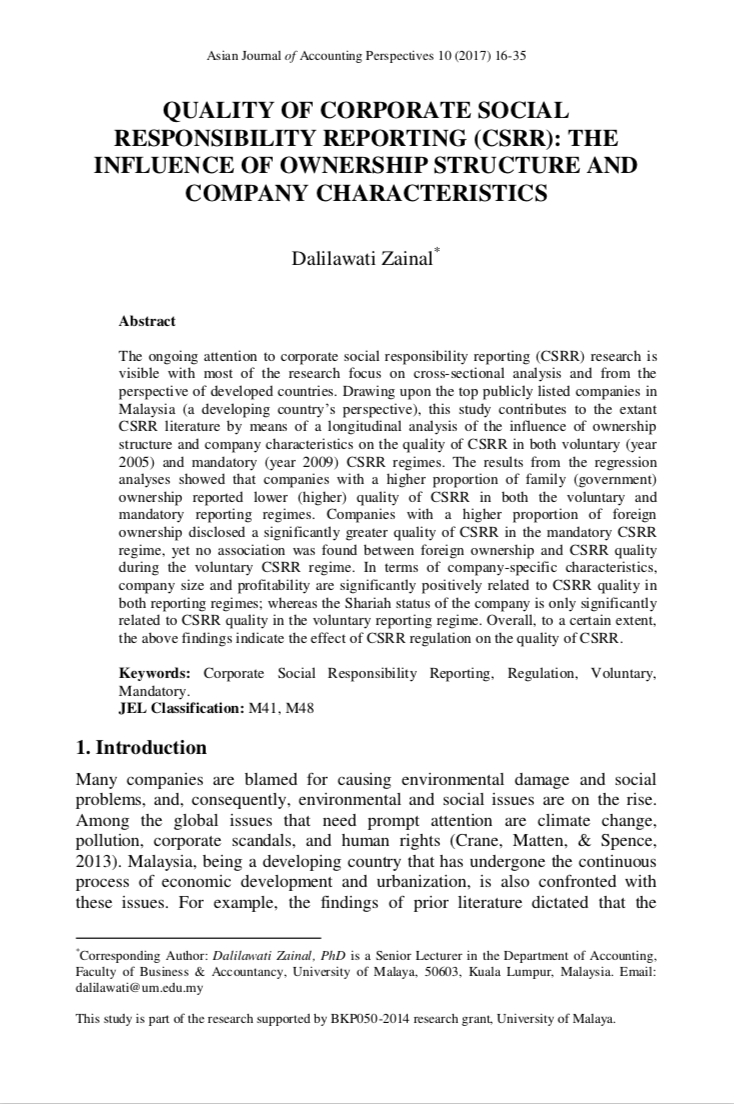Quality of Corporate Social Responsibility Reporting (CSRR): The Influence of Ownership Structure and Company Character
Main Article Content
Abstract
The ongoing attention to corporate social responsibility reporting (CSRR) research is visible with most of the research focus on cross-sectional analysis and from the perspective of developed countries. Drawing upon the top publicly listed companies in Malaysia (a developing country’s perspective), this study contributes to the extant CSRR literature by means of a longitudinal analysis of the influence of ownership structure and company characteristics on the quality of CSRR in both voluntary (year 2005) and mandatory (year 2009) CSRR regimes. The results from the regression analyses showed that companies with a higher proportion of family (government) ownership reported lower (higher) quality of CSRR in both the voluntary and mandatory reporting regimes. Companies with a higher proportion of foreign ownership disclosed a significantly greater quality of CSRR in the mandatory CSRR regime, yet no association was found between foreign ownership and CSRR quality during the voluntary CSRR regime. In terms of company-specific characteristics, company size and profitability are significantly positively related to CSRR quality in both reporting regimes; whereas the Shariah status of the company is only significantly related to CSRR quality in the voluntary reporting regime. Overall, to a certain extent, the above findings indicate the effect of CSRR regulation on the quality of CSRR.
Keywords: Corporate Social Responsibility Reporting, Regulation, Voluntary, Mandatory
JEL Classification: M41, M48
Downloads
Article Details
License
The Asian Journal of Accounting Perspectives (AJAP) articles are published under a licence equivalent to the Creative Commons Attribution-NonCommercial-NoDerivs License (CC BY-NC-ND). The licence allows users to copy, distribute, and transmit an article as long as the author is attributed. The article is not used for commercial purposes. The work is not modified or adapted in any way.
Copyright
Authors are required to sign the Exclusive License to Publish agreement upon publication in the AJAP. The agreement grants the Publisher (Faculty of Business and Accountancy, Universiti Malaya) to publish and disseminate the articles.
Open Access
Articles published in the AJAP are digital, online, free of charge, and free of most copyright and licensing restrictions.
Article Processing Charge
Articles publish in AJAP is free submission, production and publication charges. However, all accepted articles are required for language editing. The AJAP officially appointed and outsourced proofreader will conduct this process, and the authors will cover the cost. AJAP does not profit from this process and transaction.
References
Ahmed Haji, A. (2013). Corporate social responsibility disclosures over time: evidence from Malaysia. Managerial Auditing Journal, 28(7), 647-676.
Ali, W., Frynas, J. G., & Mahmood, Z. (2017). Determinants of Corporate Social Responsibility (CSR) Disclosure in Developed and Developing Countries: A Literature Review. Corporate Social Responsibility and Environmental Management, 24(4), 273-294.
Alotaibi, K. O., & Hussainey, K. (2016). Determinants of CSR disclosure quantity and quality: Evidence from non-financial listed firms in Saudi Arabia. International Journal of Disclosure and Governance, 13(4), 364-393.
Amran, A., & Devi, S. S. (2008). The impact of government and foreign affiliate influence on corporate social reporting: The case of Malaysia. Managerial Auditing Journal, 23(4), 386-404.
Ang, J. B. (2008). Economic development, pollutant emissions and energy consumption in Malaysia. Journal of Policy Modeling, 30, 271-278.
Aribi, Z. A., & Gao, S. (2010). Corporate social responsibility disclosure: A comparison between Islamic and conventional financial institutions. Journal of Financial Reporting and Accounting, 8(2), 72-91.
Ball, R., Robin, A., & Wu, J. S. (2003). Incentives versus standards: properties of accounting income in four East Asian countries. Journal of Accounting and Economics, 36(1), 235-270.
Baydoun, N., & Willett, R. (2000). Islamic corporate reports. Abacus, 30(1), 71-81.
Block, J. H., & Wagner, M. (2014). The effect of family ownership on different dimensions of corporate social responsibility: Evidence from large US firms. Business Strategy and the Environment, 23(7), 475-492.
Branco, M. C., & Rodrigues, L. (2008). Social responsibility disclosure: A study of proxies for the public visibility of Portuguese banks. The British Accounting Review, 40(2), 161-181.
Bursa Malaysia. (2007). Corporate Social Responsibility in Malaysian PLCs: 2007 Status Report. Kuala Lumpur, Malaysia.
Campopiano, G., & De Massis, A. (2015). Corporate social responsibility reporting: A content analysis in family and non-family firms. Journal of Business Ethics, 129(3), 511-534.
Chapple, W., & Moon, J. (2005). Corporate social responsibility (CSR) in Asia: A seven-country study of CSR web site reporting. Business and Society, 44(4), 415-441.
Chen, S., Chen, X. I. A., & Cheng, Q. (2008). Do family firms provide more or less voluntary disclosure? Journal of Accounting Research, 46(3), 499-536.
Crane, A., Matten, D., & Spence, L. J. (2013). Corporate social responsibility in a global context. Chapter in: Crane, A., Matten, D., and Spence, LJ, 'Corporate Social Responsibility: Readings and Cases in a Global Context, 2, 3-26.
Criado-Jimenez, I., Fernandez-Chulian, M., Larrinage-Gonzalez, C., & Husillos-Carques, F. J. (2008). Compliance with mandatory environmental reporting in financial statements: The case of Spain (2001–2003). Journal of Business Ethics, 79(3), 245-262.
El Ghoul, S., Guedhami, O., Wang, H., & Kwok, C. C. (2016). Family control and corporate social responsibility. Journal of Banking & Finance, 73, 131-146.
Elmogla, M., Cowton, C. J., & Downs, Y. (2015). Corporate social reporting in Libya: a research note. Social Responsibility Journal, 11(4), 923-932.
Eng, L. L., & Mak, Y. T. (2003). Corporate governance and voluntary disclosure. Journal of Accounting and Public Policy, 22(4), 325-345.
Feng, F., Sun, Q., & Tong, W. H. S. (2004). Do government-linked companies underperform? Journal of Banking & Finance, 28(10), 2461-2492.
Fifka, M. S. (2013). Corporate Responsibility Reporting and its Determinants in Comparative Perspective–a Review of the Empirical Literature and a Meta‐analysis. Business Strategy and the Environment, 22(1), 1-35.
Freedman, M., & Jaggi, B. (2005). Global warming, commitment to the Kyoto protocol, and accounting disclosures by the largest global public firms from polluting industries. The International Journal of Accounting, 40, 215-232.
Ghazali, N. A. M. (2007). Ownership structure and corporate social responsibility disclosure: some Malaysian evidence. Corporate Governance: The International Journal of Business in Society, 7(3), 251-266.
Gugler, P., & Shi, J. Y. J. (2009). Corporate social responsibility for developing country multinational corporations: Lost war in pertaining global competitiveness. Journal of Business Ethics, 87, 3-24.
Gunardi, A., Febrian, E., & Herwany, A. (2016). The implication of firm-specific characteristics on disclosure: the case of Indonesia. International Journal of Monetary Economics and Finance, 9(4), 379-387.
Habbash, M. (2016). Corporate governance and corporate social responsibility disclosure: evidence from Saudi Arabia. Social Responsibility Journal, 12(4), 740-754.
Hąbek, P., & Wolniak, R. (2016). Assessing the quality of corporate social responsibility reports: the case of reporting practices in selected European Union member states. Quality & Quantity, 50(1), 399-420.
Hackston, D., & Milne, M. J. (1996). Some determinants of social and environmental disclosures in New Zealand companies. Accounting, Auditing & Accountability Journal, 9(1), 77-108.
Hahn, R., & Kuhnen, M. (2013). Determinants of sustainability reporting: a review of results, trends, theory, and opportunities in an expanding field of research. Journal of Cleaner Production, 59, 5-21.
Haniffa, R. M., & Cooke, T. E. (2005). The impact of culture and governance on corporate social reporting. Journal of Accounting and Public Policy, 24(5), 391-430.
Hasseldine, J., Salama, A., & Toms, J. (2005). Quantity versus quality: The impact of environmental disclosures on the reputations of UK Plcs. The British Accounting Review, 37(2), 231-248.
Hooks, J., & Van Staden, C. J. (2011). Evaluating environmental disclosures: The relationship between quality and extent measures. British Accounting Review, 43, 200-213.
Huang, C. L., & Kung, F. H. (2010). Drivers of environmental disclosure and stakeholder expectation: Evidence from Taiwan. Journal of Business Ethics, 96, 435-451.
Hussainey, K., Elsayed, M., & Razik, M. A. (2011). Factors affecting corporate social responsibility disclosure in Egypt. Corporate Ownership and Control journal, 1-27.
Jaggi, B., Leung, S., & Gul, F. (2009). Family control, board independence and earnings management: Evidence based on Hong Kong firms. Journal of Accounting and Public Policy, 28(4), 281-300.
Jenkins, H., & Yakovleva, N. (2006). Corporate social responsibility in the mining industry: Exploring trends in social and environmental disclosure. Journal of Cleaner Production, 14, 271-284.
Joseph, C., & Taplin, R. (2011). The measurement of sustainability disclosure: Abundance versus occurence. Accounting Forum, 35, 19-31.
Kamla, R., Gallhofer, S., & Haslam, J. (2006). Islam, nature and accounting: Islamic principles and the notion of accounting for the environment. Accounting Forum, 30(3), 245-265.
Khan, H. U. Z., Halabi, A. K., & Samy, M. (2009). Corporate social responsibility (CSR) reporting: a study of selected banking companies in Bangladesh. Social Responsibility Journal, 5(3), 344-357.
Maali, B., Casson, P., & Napier, C. (2006). Social reporting by Islamic banks. Abacus, 42(2), 266-289.
Mak, Y. T., & Li, Y. (2001). Determinants of corporate ownership and board structure: Evidence from Singapore. Journal of Corporate Finance, 7(3), 235-256.
Mangena, M., & Tauringana, V. (2007). Disclosure, corporate governance and foreign share ownership on the Zimbabwe stock exchange. Journal of International Financial Management and Accounting, 18(2), 53-85.
McGuinness, P. B., Vieito, J. P., & Wang, M. (2017). The role of board gender and foreign ownership in the CSR performance of Chinese listed firms. Journal of Corporate Finance, 42, 75-99.
Meek, G. K., & Gray, S. J. (1989). Globalization of stock markets and foreign listing requirements: Voluntary disclosures by Continental European companies listed on the London Stock Exchange. Journal of International Business Studies, 20(2), 315-336.
Michelon, G., Pilonato, S., & Ricceri, F. (2015). CSR reporting practices and the quality of disclosure: An empirical analysis. Critical Perspectives on Accounting, 33, 59-78.
Murad, W., Islam Molla, R., Mokhtar, M., & Raquib, A. (2010). Climate change and agricultural growth: an examination of the link in Malaysia. International Journal of Climate Change Strategies and Management, 2(4), 403-417.
Muyibi, S. A., Ambali, A. R., & Eissa, G. S. (2008). The impact of economic development on water pollution: Trends and policy actions in Malaysia. Water Resources Management, 22(4), 485-508.
Oh, W. Y., Chang, Y. K., & Martynov, A. (2011). The effect of ownership structure on corporate social responsibility: Empirical evidence from Korea. Journal of Business Ethics, 104, 283-297.
Ortas, E., Gallego Alvarez, I., & Álvarez Etxeberria, I. (2015). Financial factors influencing the quality of corporate social responsibility and environmental management disclosure: A quantile regression approach. Corporate Social Responsibility and Environmental Management, 22(6), 362-380.
Ousama, A. A., & Fatima, A. H. (2010). Voluntary disclosure by Shariah approved companies: an exploratory study. Journal of Financial Reporting and Accounting, 8(1), 35-49.
Roberts, R. W. (1992). Determinants of corporate social responsibility disclosure: An application of stakeholder theory. Accounting, Organizations and Society, 17(6), 595-612.
Said, R., Zainuddin, Y. H., & Haron, H. (2009). The relationship between corporate social responsibility disclosure and corporate governance characteristics in Malaysian public listed companies. Social Responsibility Journal, 5(2), 212-226.
Sethi, S. P., Martell, T. F., & Demir, M. (2015). An evaluation of the quality of corporate social responsibility reports by some of the world’s largest financial institutions. Journal of Business Ethics, 1-19.
Ullmann, A. A. (1985). Data in search of a theory: A critical examination of the relationships among social performance, social disclosure, and economic performance of US firms. The Academy of Management Review, 10(3), 540-557.
Wan-Hussin, W. N. (2009). The impact of family-firm structure and board composition on corporate transparency: Evidence based on segment disclosures in Malaysia. The International Journal of Accounting, 44(4), 313-333.
Zainal, D., Zulkifli, N., & Saleh, Z. (2013). Corporate social responsibility reporting in Malaysia: A comparison between shariah and non-shariah approved firms. Middle-East Journal of Scientific Research, 15(7), 1035-1046.
Zulkifli, N. (2012). Social environmental accounting education issues in Malaysia. Kuala Lumpur: University of Malaya Press.

